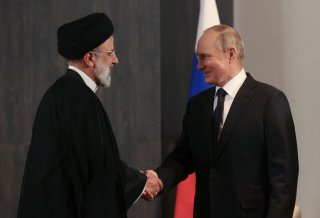Will Iran Have Free Rein After Ukraine?
Just like many European nations were loath to give up their dependence on Russian gas, Israel and the Gulf Arab states might prove unwilling to give up their long-held hopes about how Russia can help restrain Iran.
Several of America’s traditional Middle Eastern allies—particularly, Israel, Saudi Arabia, the United Arab Emirates (UAE), and Bahrain—have long been fearful of Iranian intentions toward them. Protection against Iran is an important part of the reason why they have sought American support. But because they fear the impact of Washington’s pursuit of the Iranian nuclear accord and decry the United States for not forcefully responding to Iranian-sponsored drone attacks, these Middle East allies have found U.S. support against Iran to be insufficient. This is one of the reasons why they have improved their relations with Russia in recent years.
On the face of it, though, this does not make sense. If America’s Middle Eastern allies consider the support they are receiving from Washington against Iran to be insufficient, what sort of support do they hope to receive from Russia against Iran when Moscow’s relations with Tehran have been relatively close? As odd as this might appear, America’s Middle Eastern allies have reason to believe that cooperating with Russia is useful for keeping Iran at bay.
Despite Russia and Iran working together to support the Bashar al-Assad regime, there is a deconfliction agreement between Russia and Israel whereby Moscow largely turns a blind eye to Israeli strikes against Iranian and Hezbollah targets in Syria. If Moscow is concerned about Iran gaining more influence in Syria than Russia, then letting the Israelis limit what Iran and its allies can do in Syria has been highly convenient. But whatever Moscow’s motive is for cooperating with the Jewish state against Iran and Hezbollah, Israel desperately wants Russia to continue honoring the agreement. This fear has motivated Israel to resist Western and Ukrainian calls to provide military or other assistance to Ukraine in its ongoing war with Russia.
Similarly, the wealthy governments of Saudi Arabia and the United Arab Emirates have sought to moderate Moscow’s support for Tehran through trade with and investment in Russia. While they have done this partly to show their independence from Washington—as well as to provide a warning that they could cooperate even more with Moscow if the United States criticizes their leaders or policies—strong Saudi and UAE economic relations with Russia are also a way to show Tehran that Moscow values its cooperation with the Gulf Arab states and doesn’t want Iran to spoil it.
Tehran is not pleased with how much Russia cooperates with its Gulf Arab and Israeli adversaries, but up until now, Iran has had to grin and bear it. Tehran, after all, is neither willing nor able to turn to America and the West for support against Russia. And China is not an alternative source of support for Iran partly because Beijing is not (yet) willing to become militarily involved in the region the way Russia has and partly because it doesn’t want to risk damaging its strong economic ties to the Gulf Arab states and Israel.
But this might change with Moscow now increasingly dependent on Iran in Ukraine. Iran has not only supplied Russia with armed drones but reportedly deployed advisers to help Russian forces use them. Russia also might soon be buying Iranian short-range ballistic missiles. Recent reports based on Western intelligence sources revealed that Tehran has agreed to help Moscow set up a production line in Russia for Iranian-designed drones. With Moscow dependent on Iran to continue its war effort in Ukraine, Tehran is obviously going to expect something in return from Moscow in addition to money.
But what does Iran want from Russia? This is not yet clear, as neither Moscow nor Tehran have indicated what this might be. Ukrainian president Volodymyr Zelenskyy and U.S. intelligence sources have suggested that Iran might seek more from Russia in the nuclear realm. Observers have already noted that while Russian diplomats were publicly pressing Iran to agree to the revival of the Joint Comprehensive Plan of Action (JCPOA), they have stopped doing so since the outbreak of the war in Ukraine. Given its greater focus on Ukraine, Moscow might countenance a greater degree of Iranian influence in Syria and a reduced willingness to abide by the Russian-Israeli deconfliction agreement to repay Tehran for its military support. Blocking any United Nations Security Council effort to punish Iran for hostile behavior toward Gulf Arab states might be another.
Neither Israel nor the Gulf Arab states, though, are likely to abandon their hopes that maintaining good relations with Russia will lead Moscow to somehow reign in Iran. Indeed, they might fear what will happen if they do not maintain good relations with Moscow. While Saudi Arabia’s agreement with Russia in the OPEC+ format to reduce oil production was widely seen as a snub toward President Joe Biden, who had asked Riyadh to increase production, the Saudis might have partially gone along with Russia for fear of what Moscow might do to help Tehran in retaliation if they did not. Similarly, Israel might fear that striking Iranian and Hezbollah targets in Syria will become more difficult and less successful if Moscow ends its deconfliction agreement.
Just like many European nations were loath to give up their dependence on Russian gas after Vladimir Putin’s forces invaded Ukraine, Israel and the Gulf Arab states might prove unwilling to give up their long-held hopes about how Russia can help restrain Iran. However, Russia’s increased dependence on Iran for military support might eventually force them to.
Mark N. Katz is a professor of government and politics at the George Mason University Schar School of Policy and Government, and a nonresident senior fellow at the Atlantic Council.
Image: Reuters.

